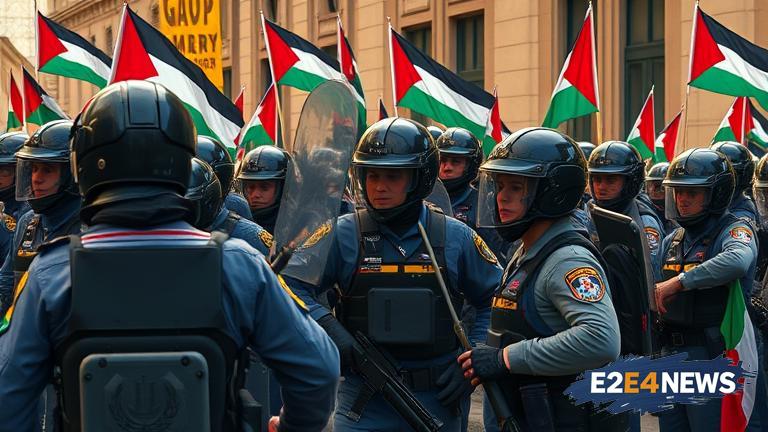In a recent wave of arrests, law enforcement has taken into custody scores of supporters of Palestine Action, a group that has been vocal about its support for Palestinian rights and its opposition to companies it deems complicit in Israeli occupation. The arrests have sparked controversy, with many arguing that the police actions are an overreach and an attempt to stifle free speech and the right to protest. Palestine Action has been known for its bold and sometimes disruptive protests, which have targeted companies such as Elbit Systems, a Israeli arms manufacturer with ties to the UK. The group’s supporters argue that their actions are necessary to bring attention to the plight of Palestinians and to pressure companies to divest from Israel. However, others have criticized the group’s tactics as too extreme and counterproductive. The police have defended their actions, stating that they are necessary to maintain public order and prevent disruptions to business. The arrests have also raised questions about the balance between free speech and public safety, with some arguing that the police are unfairly targeting certain groups. The controversy surrounding Palestine Action and its supporters is not new, as the group has been the subject of debate and criticism for some time. Despite this, the group remains committed to its cause, and its supporters continue to protest and advocate for Palestinian rights. The issue has also sparked a wider debate about the Israeli-Palestinian conflict and the role of international companies in the occupation. Many have called for greater awareness and action on the issue, and for companies to be held accountable for their actions. The arrests of Palestine Action supporters have also highlighted the need for greater understanding and dialogue between different communities and perspectives. As the situation continues to unfold, it remains to be seen how the controversy will be resolved and what impact it will have on the wider debate about Palestinian rights and the Israeli-Palestinian conflict. The international community is watching closely, and many are calling for a peaceful and just resolution to the conflict. In the meantime, Palestine Action and its supporters remain committed to their cause, and the debate about free speech, protest rights, and the Israeli-Palestinian conflict continues. The arrests have also sparked a reaction from human rights groups, who have criticized the police actions as an attempt to silence dissenting voices. The issue is complex and multifaceted, and it will likely continue to be a subject of debate and controversy for some time to come. As the world watches, it is clear that the situation will require a nuanced and thoughtful approach to resolve.
